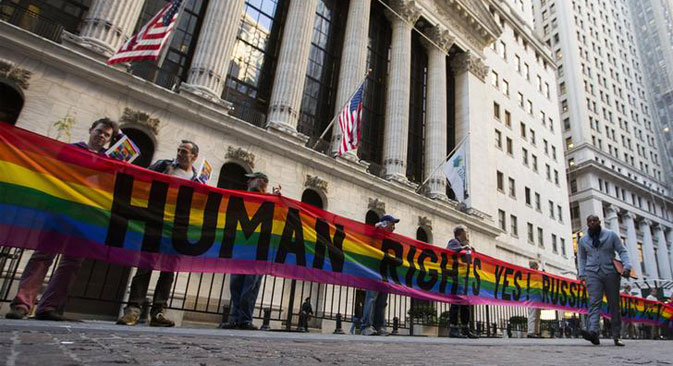
LGBT activists protested Russia Day at the New York Stock Exchange. Source: Reuters
The New York Stock Exchange (NYSE) last week devoted a day to Russia. In the ensuing 24-hour news cycle, much of the media focus was on the LGBT activists stationed outside 11 Wall Street, holding a block-long rainbow flag and protesting Russia’s anti-gay propaganda law.
But inside, dozens of investors convened to listen to bankers and analysts who have been working in Russia over the past two decades.
NYSE Euronext is the first cross-border exchange, and issuers who meet the requirements for listing in the European Union can list on Euronext. And despite ongoing protests and pressure to disinvest due to humanitarian concerns, experienced Russia hands described a country that is increasingly more conducive to foreign investment.
In fact, foreign investment into Russia continues to grow at a rapid clip. Last week, the Federal State Statistics Service agency in Moscow announced that overall foreign investment increased in the first three quarters of 2013 by 15.7 percent year-on-year, rising to $132.4 billion, according to RIA Novosti.
In the next few years, more and more Russian companies will enter the international marketplace — making them attractive investments — according to veteran speakers at the event. Panelists included officials from the St. Petersburg International Economic Forum (SPIEF) and NYSE Euronext, as well as private investors.
“In the course of the next five years, IT, healthcare and media companies are all set to become very strong prospects,” said Drew Guff, managing director and founder of Siguler Guff & Co.
Albert Ganyushin, head of international listing for NYSE Euronext, said: “There are now many Russian companies in the technological field, and we will soon see the best of these small enterprises coming over here [to NYSE] and trying to attract interest from investors.”
Guff has been working in Russia for 20 years; in 1994, he was involved in the formation of one of the first private equity funds to invest in Russia. He also steered foreign investment to Russia’s best companies — from MTV Russia to Syktyvkar Pulp & Paper to MDM Bank.
Two years ago, Guff accepted the Woodrow Wilson Award for Corporate Citizenship in Washington, D.C. At that time he predicted that the tremendous changes that have taken place in Russia over the past two decades will be more than matched in the next two decades.
Analysts give Russian IT company favorable forecast
Gay Russians in New York: Can’t find my way home
Kudrin: Russia urgently needs to change its economic policies
Guff said at the award ceremony. “I believe we will see a kind of ‘Russia 2.0’ during the next six years.”
Russia Day at the NYSE was chock full of bilateral business topics, from the country’s plan to accelerate and broaden privatization to the recent, dramatic news that Russia jumped 20 places in the World Bank’s Ease of Doing Business Survey — to 92, ahead of China.
The World Bank survey also emphasized that the infrastructure for foreign investment has developed significantly just in the last year in Russia.
“Russia Day is an important event and it was a successful day,” said Guff after the event. He acknowledged that there was a bit of “preaching to the choir,” at the NYSE, in that the people in attendance are looking at Russia through the prism of business opportunity.
The success stories of American businesses in Russia are well documented, from Cisco to Boeing. But these are major American companies that had the capital and clout to succeed in Russia, panelists said. Guidelines put in place through WTO accession have been helpful to Russian and American companies in the past 12 months, they noted.
Moderator Ryan Chilcote, a London-based presenter for Bloomberg television who spent many years in Russia covering the business climate, also discussed the Russian companies that have performed well in the United States, from Lukoil to Russian Standard vodka.
But Chilcote also reminded the eager business audience that corporate governance, corruption and human rights are still issues — the LGBT protests outside the barricades a strong case in point. “To what extent do these issues keep Russia isolated?” he asked the panel.
“Political issues are still at the forefront of investors’ minds,” said David Gottlieb, partner at Cleary Gottlieb Steen & Hamilton in London.
Sergei Belyakov, described by attendees as representing “a new generation” at Russia’s Ministry of Economic Development, could not address those concerns. But he told potential investors that Russia had made progress in the area of corporate governance and minority shareholder rights. He also discussed new governmental support of small and medium-sized businesses.
Duncan Neiderauer, CEO of NYSE Euronext, tried to address these humanitarian concerns in his address, letting Russian officialdom know that U.S. concerns about how the Russian LGBT community is treated will not go away.
At the same time, Neiderauer declined to cancel Russia Day, despite pressure to do so. “Events like Russia Day provide an opportunity to foster dialogue on a number of topics. In fact it would not surprise me in the slightest if an attendee or potential investor were to express concerns over the issues raised,” the CEO of NYSE Euronext wrote in response to a petition to cancel Russia Day.
Neiderauer added that the purpose of the event was to “convene a forum for business leaders and interested parties from across the globe to meet and discuss economic policies, entrepreneurship, financial market development and job creation.”
In the past, according to Ganyushin, “emotions and fears have gotten in the way of investment, as well as stereotyping.” Russia Day was, among other things, an opportunity to help American business become savvy, familiar with, and discerning of Russian companies.
All rights reserved by Rossiyskaya Gazeta.
Subscribe
to our newsletter!
Get the week's best stories straight to your inbox